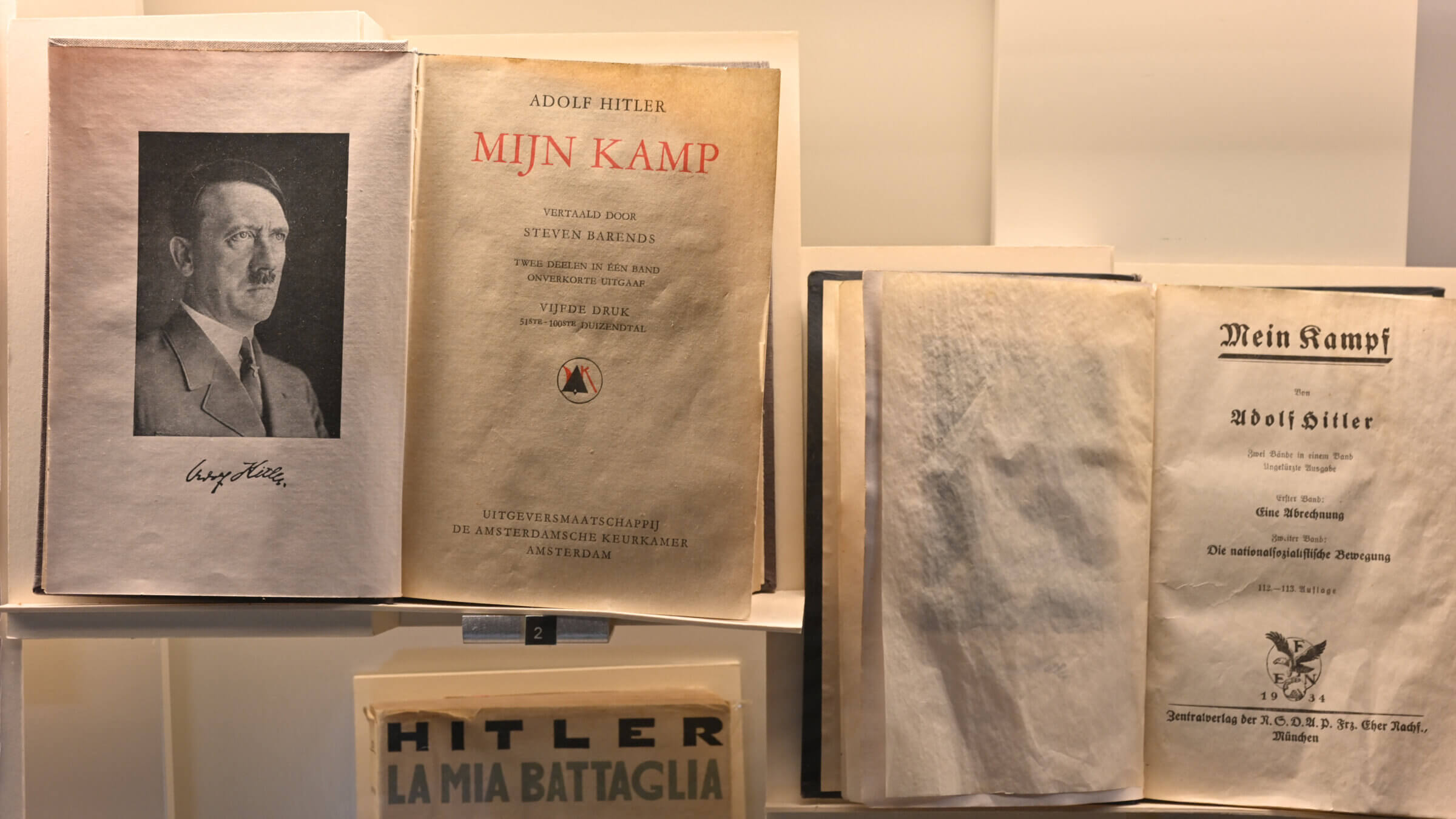Trump lawyer who praised ‘Mein Kampf’ is now accusing Harvard of antisemitism, report says
Michael Velchik praised the book shortly after graduating from Harvard, where he also wrote an essay from the perspective of Hitler

Adolf Hitler’s Mein Kampf, accompanied by his portrait, at the Shoah Memorial in Paris, France. Photo by Henrique Campos/Hans Lucas/AFP via Getty Images
A Justice Department attorney who has defended the Trump administration’s crackdown on Harvard over allegations of antisemitism once praised Adolf Hitler’s autobiography and submitted an undergraduate assignment written from the Nazi leader’s perspective, according to an article in The Boston Globe.
Michael Velchik, the government lawyer, received both his undergraduate and law degree from Harvard. After Harvard sued the Trump administration over the suspension of hundreds of millions of dollars in research funding, Velchik defended the move in federal court: “The choice was made, let’s not give federal taxpayer dollars to institutions that exhibit a wanton indifference to antisemitism,” he said at a July hearing.
But the Globe reported Tuesday that three anonymous individuals familiar with the matter said that, as a senior at Harvard, Velchik turned in a paper in the voice of Adolf Hitler in response to a prompt in his Latin class asking students to submit an essay written from the perspective of a controversial figure. The essay rattled the instructor, who asked Velchik to write a new paper, according to the article.
After graduating, Velchik told a peer that Mein Kampf, Hitler’s autobiography and manifesto, was the book he had enjoyed reading the most while spending a year traveling, according to an email obtained by the Globe. The email did not mention the Holocaust.
“[I]s it bad that my favorite class at harvard was nietzsche and my favorite book i’ve read this year is mein kampf?” Velchik wrote in the June 2013 email. The article stated that he later wrote a brief review of the book that called it “fascinating” and mused that Hitler “excelled as an orator” and “understands the importance of propaganda.”
Brett Shumate, an assistant attorney general, defended Velchik to the Globe. “Michael has handled some of the Civil Division’s most important cases defending the President’s agenda in court with the utmost respect and professionalism,” Shumate said.
The Trump administration has acted aggressively against universities accused of antisemitism, mostly over how they handled student protests related to the Israel-Hamas war, yanking billions of dollars in federal grants from schools including Harvard, Columbia and Brown.
Columbia and Brown reached sweeping settlements with the government to restore funding, but Harvard has so far chosen to challenge the administration in court.
Latest in string of controversies
Despite the administration’s stated focus on countering antisemitism, it has largely ignored right-wing antisemitism. Velchik is only the latest Trump official to come under scrutiny for their views related to Jews. Leo Terrell, chair of an interagency antisemitism task force, shared a post on X (formerly Twitter) in March from a white supremacist who joked that President Donald Trump “has the ability to revoke someone’s Jew card.”
And Elon Musk, who Trump empowered to make sweeping cuts to the federal government in the early months of his administration, has accused Jews of generating animosity toward white people and performed what many believed was a Nazi salute during an inaugural rally in January.
More recently, Kingsley Wilson, a Defense Department official who was elevated to serve as the Pentagon’s press secretary in May, was criticized for repeatedly claiming that Jewish lynching victim Leo Frank, whose murder inspired the creation of the Anti-Defamation League, was guilty.
Velchik was the sole attorney representing the government at a July hearing in the Harvard case, where Judge Allison D. Burroughs, who is Jewish, pressed him on the government’s decision to suspend research funding to the university.
“Let’s assume for the sake of argument that Harvard has not covered itself in glory on the topic of antisemitism,” she said. “You’re not taking away grants from labs that have been antisemitic.”















